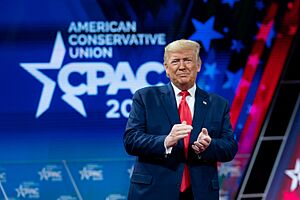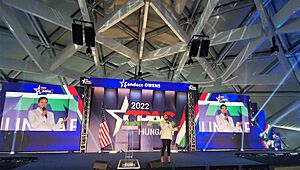American Conservative Union facts for kids

Donald Trump addresses the Conservative Political Action Conference, sponsored by ACU, in February 2020
|
|
| Formation | December 18, 1964 |
|---|---|
| Legal status | 501(c)(4) |
| Location |
|
|
Chairman
|
Matt Schlapp |
|
Revenue
|
$16,702,315 (2018) |
The American Conservative Union (ACU) is a political group in the United States. It supports conservative ideas and policies. The ACU also rates politicians based on how conservative they are. It organizes a big meeting called the Conservative Political Action Conference. The ACU started on December 18, 1964. It calls itself the oldest group that works to influence government for conservative causes in the U.S. The ACU cares about things like personal freedom and traditional values. They see these as key parts of conservatism.
Contents
What the ACU Does
The ACU is made up of three main parts. Each part has a different job.
- The American Conservative Union is a group that works to influence laws. This is called lobbying.
- The American Conservative Union Foundation is known for hosting the Conservative Political Action Conference. This part also teaches people about conservative ideas.
- The American Conservative Union Political Action Committee helps conservative politicians get elected. It supports them with money and public approval.
How Politicians Are Rated
Since 1971, the ACU has used a special system. It rates politicians on how conservative they are. This rating system helps people see how lawmakers vote. It shows if their votes match conservative ideas.
The ACU Foundation looks at votes that lawmakers have already made. Each rating helps explain a politician's view on government. For example, if certain conservative lawmakers vote one way and a liberal lawmaker votes another, it shows a clear difference.
Politicians get a score, usually a percentage. If a politician scores over 80%, they are called an "ACU Conservative." These scores are often used in studies about politics. They also appear in news stories and during election campaigns.
Conservative Political Action Conference
The most famous event the ACU organizes is the Conservative Political Action Conference (CPAC). This is a big meeting held every year by the ACU Foundation. Thousands of people attend CPAC each year.
Many important conservative leaders speak at CPAC. These speakers often include presidents, vice presidents, governors, and other famous people. For example, CPAC 2017 featured President Donald Trump and Vice President Mike Pence.
ACU Foundation's Work
The ACU Foundation aims to teach the public about conservative ideas. It has five "policy centers" that focus on different areas. These centers are:
- Center for Arts and Culture
- Center for Human Dignity
- Center for Statesmanship & Diplomacy
- Center for 21st Century Property Rights
- Center for Criminal Justice Reform (CCJR)
These centers mostly share articles on their topics. The CCJR is the largest of these centers. It works to change criminal justice laws in a conservative way. The CCJR advises government officials and speaks to the media. It also provides expert opinions at government hearings.
The CCJR focuses on two main areas. It works to prevent civil asset forfeiture. This is when the government takes property from people accused of crimes before they are found guilty. It also works to increase mental health services in the justice system. The CCJR works with other groups on the "Right on Crime" campaign. They also host a discussion panel at CPAC every year.
ACU's History
How the ACU Started
The American Conservative Union was one of many conservative groups formed in the 1960s. This was a time when conservative ideas were becoming stronger. Many people believed that conservatism was becoming a major political force.
During this time, there was a growing divide between liberals and conservatives. Activists started to build a strong conservative movement. They formed groups like Young Americans for Freedom and the ACU. These groups focused on long-term plans and getting conservatives into public office.
The ACU was founded in December 1964. It was created after Barry Goldwater lost his presidential campaign. This loss showed that liberal ideas were very strong in America. Key founders included Frank S. Meyer, William F Buckley Jr, and Robert E. Bauman. They organized the first meeting.
At first, a board of 50 directors was chosen. Members included Lammot Copeland and John Dos Passos. The group grew quickly. It had 7,000 members within nine months. By the end of 1972, it had 45,000 members.
The ACU wanted to bring conservatives together. Its founding documents made it clear that the ACU was separate from the John Birch Society. The ACU leaders had different views on world events than the John Birch Society.
Influencing Foreign Policy
The ACU spent a lot of money to oppose the Panama Canal treaties in 1977. These treaties would give control of the Panama Canal to Panama. The ACU sent out about 2.4 million letters to people. This helped them raise money to support politicians who were against the treaties.
They also made a 30-minute TV ad. It was shown on 150 TV stations in 18 states. They also placed newspaper ads in 30 states. These ads encouraged people to write to their senators to oppose the treaties. The ACU also helped fund a group called a "truth squad." This group tried to get more public interest in the treaties. They wanted to pressure senators to vote against them.
Even with these efforts, the two treaties were signed on September 7, 1977. They were approved by Panama in October 1977. The U.S. Senate approved them in March and April 1978.
In 1980, the ACU worked to defeat the SALT II treaty. This treaty aimed to limit nuclear weapons. The ACU and other conservative groups spent much more money than those who supported the treaty. The ACU used mass mailings again. They reached about 500,000 people. They also made a TV program against SALT II. It was shown on 200 TV stations across the country.
In 1985, the ACU supported aid for the Contras in Nicaragua. They sent out about 100,000 pieces of mail. They also brought Nicaraguan refugees to Capitol Hill. This was to convince politicians to support President Reagan's request for aid.
ACU Leaders
Many important people helped start the ACU. These included William F. Buckley, Jr., Rep. Donald Bruce, and Frank Meyer. Donald Bruce was the first chairman from 1964 to 1966. John Ashbrook followed him from 1966 to 1971.
M. Stanton Evans was chairman for six years, from 1971 to 1977. Then Philip Crane served for two years. Mickey Edwards was chairman from 1979 to 1983.
David Keene was chairman from 1984 until 2011. Al Cardenas took over and served until 2014.
The current chairman is Matt Schlapp. He became chairman after Al Cardenas in 2014. Matt Schlapp used to be a political director for President George W. Bush.
Lobbying Today
The American Conservative Union spends money to influence government decisions. This is called lobbying. According to OpenSecrets, a group that tracks money in politics, the ACU spent money on lobbying in different years.
- In 2001, they spent about $20,000.
- In 2003, they spent about $400,000.
- In 2005, they spent about $1,100,000.
- They did not spend any money on lobbying in 2004.
Since Matt Schlapp became chairman, the organization has spent $120,000 on lobbying. Lorenz Hart and Amir Iljazi are two people who often lobby for the ACU.
See also
 In Spanish: Unión Conservadora Estadounidense para niños
In Spanish: Unión Conservadora Estadounidense para niños
 | James Van Der Zee |
 | Alma Thomas |
 | Ellis Wilson |
 | Margaret Taylor-Burroughs |


